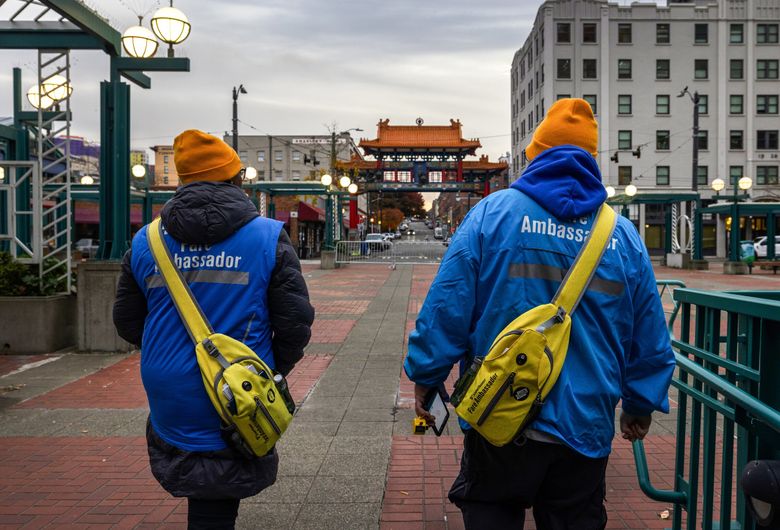
With a beep of its horn, the Link light rail train leaves the International District/Chinatown Station, heading north. In a middle car, J Herbert Sigmon rouses a dozing young man as the train glides toward Pioneer Square. It’s early — 6:30 a.m. The sun won’t rise for an hour.
Sigmon, in a light blue jacket, is there to check if the man paid his fare. He’s an “ambassador” for Sound Transit tasked with roaming the train cars to ask passengers whether they’ve tapped their card or paid cash for a ticket before boarding. This man hadn’t. His eyes were heavy and his belongings stretched onto the seat next to him and the car’s floor. He’d been cold, he told Sigmon, and had nowhere else to go to warm up.
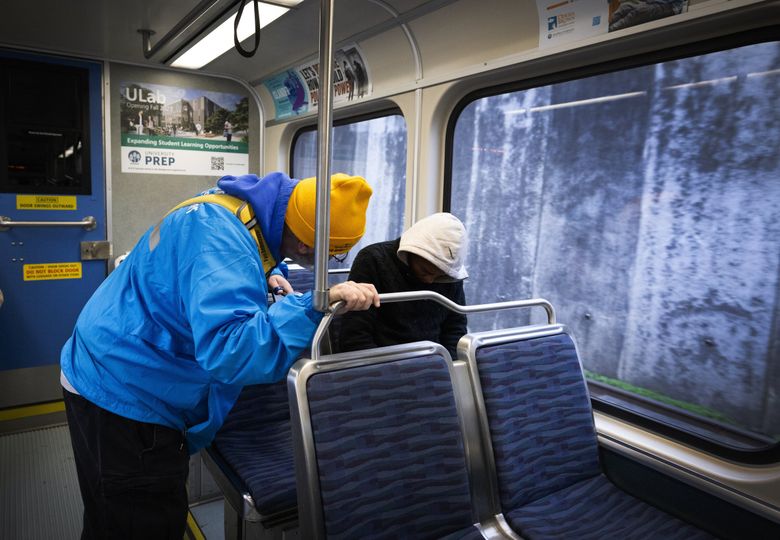
Sigmon too had been homeless until recently, staying on and off with friends and in hotels for 10 years. Only last May did he and his partner move into an apartment. He also sometimes rode transit without paying.
“Being homeless, to me, was a learning experience so that I could take what I’ve been through and help other people out,” he said.
Sigmon and his work partner, Arzmella Hammond, are two faces of Sound Transit’s new approach to fare enforcement. In a system with no turnstiles, the job was once done by security guards, with their quasi-police vests and arm patches. Neither Hammond nor Sigmon come from that world. Sigmon bounced between jobs and Hammond worked in customer service. Their supervisor, Malcom Carroll, worked in churches in South Seattle.
It’s a job — starting pay at $21.63 an hour — born out of COVID-19 and the protests of 2020, when questions of equity in enforcement drove board members to permanently sunset the fare officer position in favor of something new. The replacement they conjured was to present a friendlier, more helpful front.
And yet, a plunge in ridership and an even steeper dive in payment has created pressure on the agency to again turn on the spigot of fare collections. The result is that Sigmon and Hammond are asked to be two things at once — both a helper for those who need it and an enforcer of Sound Transit’s policies. Neither a cop nor a social worker, but somewhere in between.
“Every person who becomes a fare ambassador has to wrestle with this,” said Carroll. “This heart that we have for passenger service and experience, but also then, the compliance policies rolling out in fullness and being empathetic and fair with our compliance. It’s trying to hold those two hats and that’s really a challenge.”
On the train, Sigmon gave the young man brochures for social services, food, shelter. He suggested the library for somewhere warm. He told him he was sorry for what he was going through.
But there was also the matter of his fare. The system dictates the man receive a warning so Sigmon ticked through a list of questions — his name, race, gender — without any way of knowing whether the answers were true. It all took three or four minutes, a flash of an interaction but long enough that Sigmon’s half of the car went largely unchecked as passengers filed off the train at the next stop.
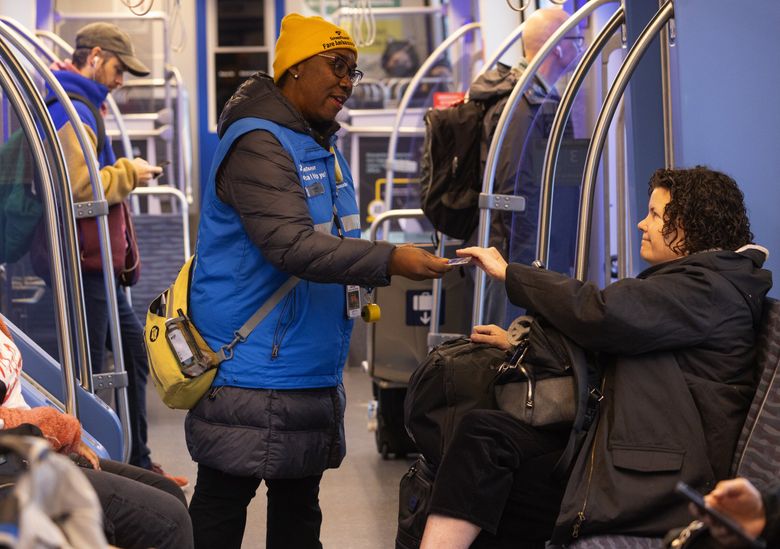
Empathy and sternness
No Sound Transit riders paid a fine for more than three years. Collections, which require some up-close interaction, were first halted as a precaution against COVID. Their reboot has come slowly, as board members continued to debate how the program should look when it returned.
Data showed it was Black passengers being cited at the highest rates, a disproportionality that doubled as the infractions grew into misdemeanors for nonpayment. In response, board members created a tiered system of warnings, then citations, then a $124 civil infraction. The possibility of fines kicked in this month.
The board also phased out outside security officers in favor of in-house ambassadors, a response to passenger feedback calling for a “friendlier, non-threatening” fare collections system. With the change came a new job description and a yellow and blue uniform. The emphasis should be on education and helping passengers access affordable fares when needed, through Sound Transit’s subsidized ORCA LIFT program.
The ambassadors’ training is four weeks. It includes anti-bias courses, lessons on engaging with people who are homeless or have disabilities or mental health challenges, instruction on first aid and CPR, bystander intervention, conflict de-escalation and more.
“I think we’ve constructed a policy that is far more equitable,” said Sound Transit board member and King County Councilmember Joe McDermott. “But we the board will need to review it in time to ensure that it’s having the outcomes we desired.”
The program began in fits and starts. Sound Transit hired 26 people in 2021; all but two quit within months. Such churn was a surprise to staff, who are accustomed to hiring engineers or planners who stay for 15 years.
“We’ve been in a constant state of hiring,” said Russ Arnold, deputy CEO of Sound Transit. “It’s just a tough job and it requires some people that are really special to do it. We’re finding those people but sometimes it’s trial and error.”
Lately, he said, the pool of applicants is deepening.
Arzmella Hammond came to Sound Transit from customer service. Her expectations were for a job collecting fares. It’s been that, and more. Besides the routine task of tapping ORCA cards, she also finds herself at one point in a long chain of upstream failures, coaching people who can’t pay and managing those whose struggles run deeper — mental illness, homelessness, drug addiction.
In many people’s eyes, she’s still a cop. Passengers avoid her eyes, patting their pockets long enough before darting off the train at the next stop. She asks for the ID of those who haven’t paid. She guesses maybe 10% comply.
It was difficult, at first, not to take some of the challenges personally. She hardened herself, to an extent.
“We have to have empathy but a little bit of sternness,” she said. If a rider hasn’t paid, she calmly tells them it’s a paid service before ticking through her list of questions to record a warning. “You know, because otherwise they take advantage of you.”
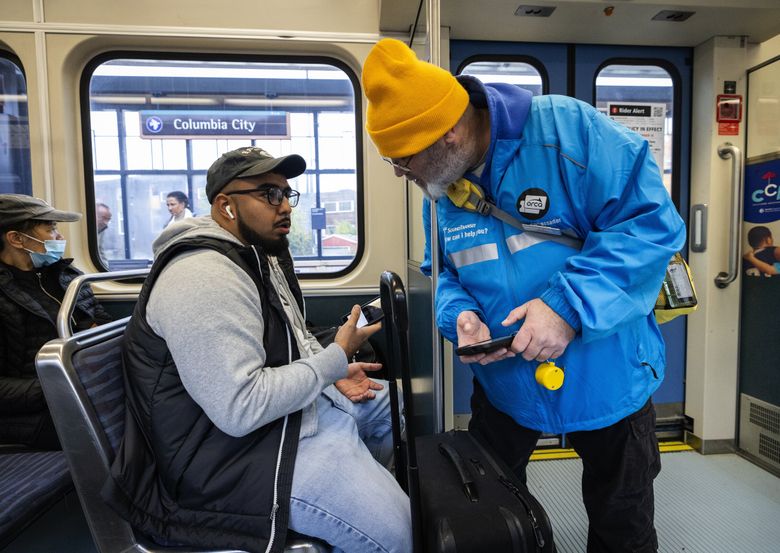
Plunging payments
Fare ambassadors have patrolled Sound Transit’s trains since 2021, but it wasn’t until this month that the agency renewed its threat to write citations to passengers. In the years since collections halted, compliance has dropped significantly. Before the pandemic, staff assumed 80% of riders were paying. Now, the belief is 55%.
Some of that drop is policy-driven: Anyone 18 or younger no longer has to pay for transit in all of Washington thanks to state funding. Regardless, it’s well off the board’s goal of 75%.
That rate could tick up since citations returned this month, but it’s unclear how many riders will ever get to that point. Ambassadors only inspected between 1% and 2% of passengers over the last year, a far cry from the 10% goal. At that rate, the chances of encountering an ambassador three times to qualify for a citation are exceedingly low.
There are currently 39 ambassadors; the board hopes to have 140 by 2026.
Sound Transit’s finances are propped up by tax collections far more than fare revenue, which accounts for roughly 7% of the total budget.
But the board’s stated goal is for fares to pay 40% of operating costs; last year that number was just 16%. Staff recently revised down their long-term estimates for fare revenue by nearly a billion dollars through 2046. So while missing ORCA taps are not likely to collapse the agency, they could spur discussion about how many trains are in service at a time.
The board as a result has voiced increasing concern about fare collections.
“We’ve sort of created an expectation that you really don’t have to pay,” said Dave Somers, board member and Snohomish County executive. “There’s no downside to it, very low risk. The fare ambassador program ramping up a bit will help, but the magnitude of the problem dwarfs the fare ambassador program and it’s going to be a difficult program to really have any teeth.”
McDermott said it’s too early to come to any conclusion how the ambassador program is working. Staffing remains low and the agency is honing strategies to improve inspections, such as checking cards on the platform rather than the train to avoid crowded cars.
“I believe this new policy continues to work to build an expectation that people tap and follow the policy of paying for the ride,” he said.
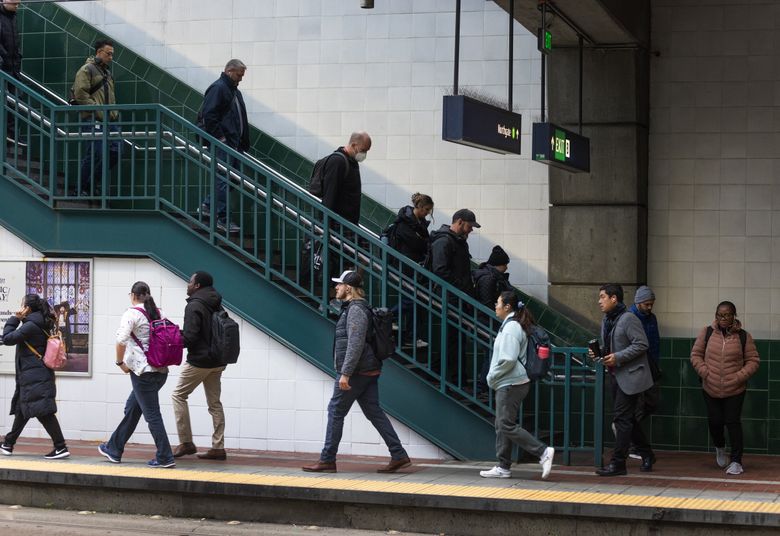
Finding the balance
A man appeared asleep in a middle car. Hammond offered a “hello” and “sir,” but he didn’t move. She tried again but his eyes remained closed.
Carroll, her supervisor who was riding as well, stepped in, and knocked on the seats.
“Fare ambassador with Sound Transit, checking in on you here,” he said. The man’s eyelids cracked.
“We’re first of all making sure you’re OK. Are you all right?” The man nodded. He was breathing.
“We’re also checking fares this morning,” Carroll said. “Do you have a fare this morning?” The man drifted back to sleep. Hammond and Carroll hovered for a moment, before stepping away, moving on to the next passenger.
Ambassadors are told to never touch people. If a passenger is causing an issue or seems to be in danger, they can call security. But the man gave his nod and so Hammond and Carroll moved on, marking in their tablets “Did Not Disclose.”
“There’s a balance there,” said Arnold, of Sound Transit. “We want to make sure there’s compliance, but we don’t want to push it to the point where things get unsafe for anyone. Because it’s not enforcement. It’s really saying you need to comply and if you aren’t compliant, trying to understand why and trying to give you what you need.”
“It can be messy,” said Carroll.
"sound" - Google News
November 27, 2023 at 09:00PM
https://ift.tt/mLKy34b
Sound Transit fare ambassadors are checking if you paid, but nicely - The Seattle Times
"sound" - Google News
https://ift.tt/UXBbD1H
Shoes Man Tutorial
Pos News Update
Meme Update
Korean Entertainment News
Japan News Update



The opinions expressed in reader comments are those of the author only and do not reflect the opinions of The Seattle Times.